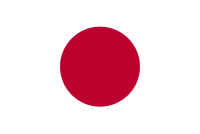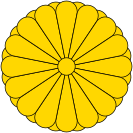Outline of Japan
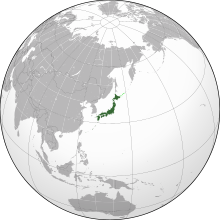
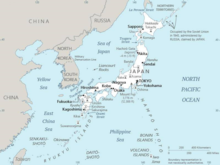
The following outline is provided as an overview of and topical guide to Japan:
Japan – an island nation in East Asia, located in the Pacific Ocean. It lies to the east of the Sea of Japan, China, North Korea, South Korea and Russia, stretching from the Sea of Okhotsk in the north to the East China Sea and Taiwan in the south. The characters that make up Japan's name mean "sun-origin" (because it lies to the east of nearby countries), which is why Japan is sometimes referred to as the "Land of the Rising Sun". Japan is an archipelago of 14,125 islands. The four largest islands are Honshu, Hokkaido, Kyushu, and Shikoku, which together comprise about ninety-seven percent of Japan's land area.
General reference
[edit]- Pronunciation: /dʒəˈpæn/ ⓘ
- Common endonyms: Nippon, Nihon (日本)
- Official endonym: Nippon-koku (日本国)
- Adjectival: Japanese
- Etymology: Name of Japan
- International rankings of Japan
- ISO country codes: JP, JPN, 392
- ISO region codes: ISO 3166-2:JP
- Internet country code top-level domain: .jp
Geography of Japan
[edit]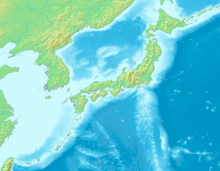
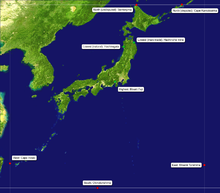
- Japan is: an island country and archipelago of 6,852 islands, shaped like the lowercase letter J.[1]
- Location:
- Pacific Ocean
- Northern Hemisphere and Eastern Hemisphere
- Time zone: Japan Standard Time (UTC+09)
- Extreme points of Japan
- High: Mount Fuji 3,776 m (12,388 ft)
- Low: Hachirōgata −4 m (−13 ft)
- Land boundaries: none
- Coastline: 29,751 km (18,486 mi)
- Population of Japan: 125,950,000 people - 11th most populous country
- Area of Japan: 377,873 km2 (145,898 sq mi) - 62nd largest country
- Atlas of Japan
- Addressing system in Japan
- Historic provinces of Japan
- Japan Standard Time
Environment of Japan
[edit]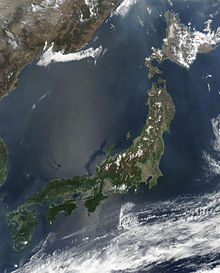
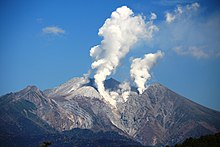
- Climate of Japan
- Environmental issues in Japan
- Ecoregions in Japan
- Energy in Japan
- Geology of Japan
- National parks of Japan
- Tsunami
- Wildlife of Japan
Geographic features of Japan
[edit]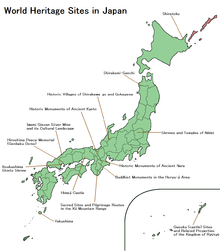
- Glaciers of Japan
- Islands of Japan
- Lakes of Japan
- Mountains of Japan
- Rivers of Japan
- Three Views of Japan
- List of World Heritage Sites in Japan
Regions of Japan
[edit]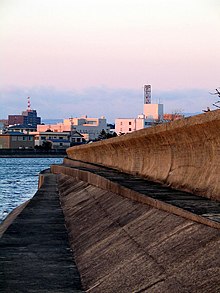
The four main islands of Japan are:
Major regions of Japan include:
- Hokkaido (the island of Hokkaido and nearby islands, largest city Sapporo)
- Tōhoku region (northern Honshu, largest city Sendai)
- Kantō region (eastern Honshu, largest cities Tokyo and Yokohama)
- Nanpō Islands: part of Tokyo Metropolis
- Chūbu region (central Honshu, including Mount Fuji), sometimes divided into:
- Hokuriku region (northwestern Chūbu)
- Kōshin'etsu region (northeastern Chūbu, largest city Nagano)
- Tōkai region (southern Chūbu, largest city Nagoya, Hamamatsu, and Shizuoka)
- Kansai or Kinki region (west-central Honshu, largest cities Osaka, Kobe, and Kyoto)
- Chūgoku region (western Honshu, largest city Hiroshima, and Okayama)
- Shikoku (island, largest city Matsuyama, and Takamatsu)
- Kyushu (island, largest city Fukuoka) which includes:
- Ryukyu Islands, including Okinawa
Ecoregions of Japan
[edit]Administrative divisions of Japan
[edit]- Administrative division types
Prefectures of Japan
[edit]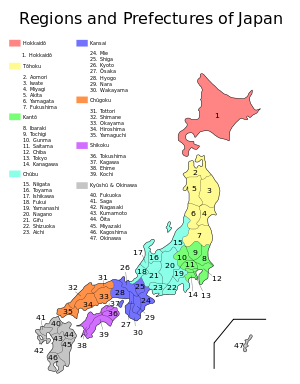
From north to south (numbering in ISO 3166-2:JP order), the prefectures of Japan and their commonly associated regions are:
|
1. Hokkaido 2. Aomori 3. Iwate 4. Miyagi 5. Akita 6. Yamagata 7. Fukushima 8. Ibaraki 9. Tochigi 10. Gunma 11. Saitama 12. Chiba 13. Tokyo 14. Kanagawa |
15. Niigata 16. Toyama 17. Ishikawa 18. Fukui 19. Yamanashi 20. Nagano 21. Gifu 22. Shizuoka 23. Aichi 24. Mie 25. Shiga 26. Kyoto 27. Osaka 28. Hyōgo 29. Nara 30. Wakayama |
31. Tottori 32. Shimane 33. Okayama 34. Hiroshima 35. Yamaguchi 36. Tokushima 37. Kagawa 38. Ehime 39. Kōchi 40. Fukuoka 41. Saga 42. Nagasaki 43. Kumamoto 44. Ōita 45. Miyazaki 46. Kagoshima 47. Okinawa |
Karafuto, a portion of the island of Sakhalin north of Hokkaido (not shown on the map), was part of Japan from 1907 until World War II. The entire island is now governed by Russia.
Municipalities of Japan
[edit]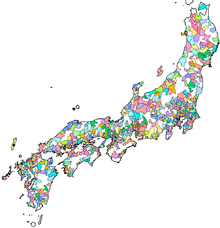
Demography of Japan
[edit]Government and politics of Japan
[edit]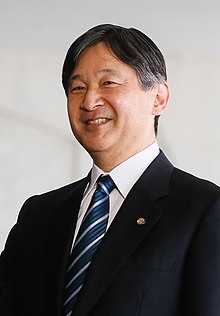
- Form of government: parliamentary multi-party representative democratic constitutional monarchy
- Capital of Japan: Tokyo
- Elections in Japan
- Imperial House of Japan (Imperial family)
- Civil service of Japan
- Japanese public corporations
- Independent administrative institutions of Japan
- Political parties in Japan
- Government-business relations in Japan
- Human rights in Japan
- Mass media and politics in Japan
- Monetary and fiscal policy of Japan
- Political funding in Japan
- Political extremism in Japan
- Taxation in Japan
- Health care system in Japan
- Social welfare in Japan
Branches of the government of Japan
[edit]Executive branch of the government of Japan
[edit]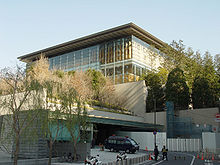
- Symbol of state: Naruhito, Emperor of Japan[a]
- Head of state: de facto head of state of Japan is the head of government, the Prime Minister (see below)
- Head of government: Shigeru Ishiba, Prime Minister of Japan
- Kantei (Office and residence of the Prime Minister)
- Prime Ministers of the past
- Cabinet of Japan
- Ministries of Japan
- National Public Safety Commission
- Ministry of Internal Affairs and Communications
- Ministry of Justice
- Ministry of Foreign Affairs
- Ministry of Finance (Japan)
- Ministry of Education, Culture, Sports, Science and Technology
- Ministry of Health, Labour and Welfare
- Ministry of Agriculture, Forestry and Fisheries
- Ministry of Economy, Trade and Industry
- Ministry of Land, Infrastructure and Transport
- Ministry of the Environment
- Ministry of Defence
Legislative branch of the government of Japan
[edit]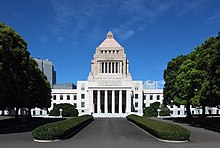
- Diet of Japan (bicameral legislature of Japan)
- National Diet Building
Judicial branch of the government of Japan
[edit]Foreign relations of Japan
[edit]
- Diplomatic missions of Japan
- Foreign aid institutions of Japan
- Foreign policy of Japan
- Japan's non-nuclear weapons policy
- Whaling in Japan
International organization membership of Japan
[edit]Japan is a member of:[3]
- African Development Bank (AfDB) (non-regional member)
- Asian Development Bank (ADB)
- Asia-Pacific Economic Cooperation (APEC)
- Asia-Pacific Telecommunity (APT)
- Association of Southeast Asian Nations (ASEAN) (dialogue partner)
- Association of Southeast Asian Nations Regional Forum (ARF)
- Australia Group
- Bank for International Settlements (BIS)
- Colombo Plan (CP)
- Council of Europe (CE) (observer)
- East Asia Summit (EAS)
- European Bank for Reconstruction and Development (EBRD)
- Energy Charter
- European Organization for Nuclear Research (CERN) (observer)
- Food and Agriculture Organization (FAO)
- Group of Five (G5)
- Group of Seven (G7)
- Group of Eight (G8)
- Group of Ten (G10)
- Group of Twenty Finance Ministers and Central Bank Governors (G20)
- Inter-American Development Bank (IADB)
- International Atomic Energy Agency (IAEA)
- International Bank for Reconstruction and Development (IBRD)
- International Chamber of Commerce (ICC)
- International Civil Aviation Organization (ICAO)
- International Criminal Court (ICCt)
- International Criminal Police Organization (Interpol)
- International Development Association (IDA)
- International Energy Agency (IEA)
- International Energy Charter
- International Federation of Red Cross and Red Crescent Societies (IFRCS)
- International Finance Corporation (IFC)
- International Fund for Agricultural Development (IFAD)
- International Hydrographic Organization (IHO)
- International Labour Organization (ILO)
- International Maritime Organization (IMO)
- International Mobile Satellite Organization (IMSO)
- International Monetary Fund (IMF)
- International Olympic Committee (IOC)
- International Organization for Migration (IOM)
- International Organization for Standardization (ISO)
- International Red Cross and Red Crescent Movement (ICRM)
- International Telecommunication Union (ITU)
- International Telecommunications Satellite Organization (ITSO)
- International Trade Union Confederation (ITUC)
- Inter-Parliamentary Union (IPU)
- Latin American Integration Association (LAIA)
- Multilateral Investment Guarantee Agency (MIGA)
- Nuclear Energy Agency (NEA)
- Nuclear Suppliers Group (NSG)
- Organisation for Economic Co-operation and Development (OECD)
- Organization for Security and Cooperation in Europe (OSCE) (partner)
- Organisation for the Prohibition of Chemical Weapons (OPCW)
- Organization of American States (OAS) (observer)
- Pacific Islands Forum (PIF) (partner)
- Paris Club
- Permanent Court of Arbitration (PCA)
- South Asian Association for Regional Cooperation (SAARC) (observer)
- Southeast European Cooperative Initiative (SECI) (observer)
- United Nations (UN)
- United Nations Conference on Trade and Development (UNCTAD)
- United Nations Disengagement Observer Force (UNDOF)
- United Nations Educational, Scientific, and Cultural Organization (UNESCO)
- United Nations High Commissioner for Refugees (UNHCR)
- United Nations Industrial Development Organization (UNIDO)
- United Nations Institute for Training and Research (UNITAR)
- United Nations Relief and Works Agency for Palestine Refugees in the Near East (UNRWA)
- Universal Postal Union (UPU)
- World Confederation of Labour (WCL)
- World Customs Organization (WCO)
- World Federation of Trade Unions (WFTU)
- World Health Organization (WHO)
- World Intellectual Property Organization (WIPO)
- World Meteorological Organization (WMO)
- World Tourism Organization (UNWTO)
- World Trade Organization (WTO)
- World Veterans Federation
- Zangger Committee (ZC)
Law and order of Japan
[edit]
- Attorneys in Japan
- Capital punishment in Japan
- Civil Code of Japan
- Constitution of Japan
- Criminal justice system of Japan
- Crime in Japan
- Juries in Japan
- Human rights in Japan
- Law enforcement in Japan
- Penal system of Japan
- Public order and internal security in Japan
Military of Japan
[edit]- Japan's non-nuclear policy
- Japan Self-Defense Forces
- Army of Japan: Japan Ground Self-Defense Force
- Navy of Japan: Japan Maritime Self-Defense Force
- Air force Japan: Japan Air Self-Defense Force
- Military history of Japan
- National security of Japan
History of Japan
[edit]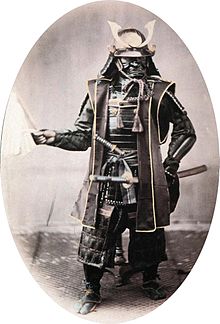
History of Japan by period
[edit]Culture of Japan
[edit]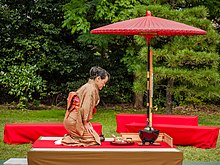
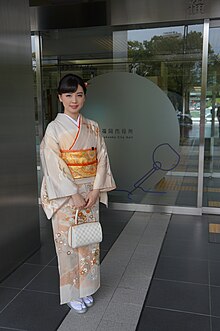
- Cultural Properties of Japan
- Japanese aesthetics
- Japanese calendar
- Etiquette in Japan
- Funerals in Japan
- Gambling in Japan
- Japanese martial arts
- Media of Japan
- Japanese museums
- Japanese mobile phone culture
- Japanese philosophy
- National symbols of Japan
- Imperial Regalia of Japan
- Imperial Seal of Japan
- Flag of Japan
- Kimigayo (National anthem of Japan)
- National Treasures of Japan
- Public bathing
- Popular culture in Japan
- Prostitution in Japan
- Records of Japan
- Japanese values
- Westernization
- World Heritage Sites in Japan
Architecture of Japan
[edit]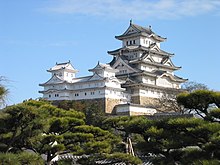
- Japanese Buddhist architecture
- Castles in Japan
- Housing in Japan
- Okinawan architecture
- Shinto shrine
Art of Japan
[edit]
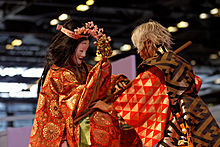
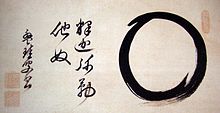
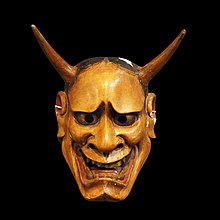
Cuisine of Japan
[edit]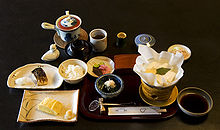
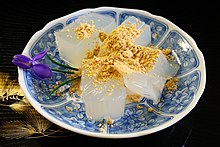
Cultural icons of Japan
[edit]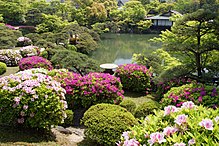
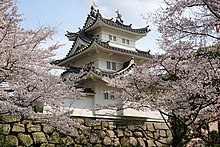
- Bonsai
- Japanese dragon
- Japanese gardens
- Geisha
- Karate
- Kimono
- Ninja
- Rising Sun Flag
- Sakura
- Sumo
- Sushi
Fashion in Japan
[edit]
- Traditional clothing
- School uniforms in Japan
- Japanese street fashion
Holidays and festivals of Japan
[edit]
Homes in Japan
[edit]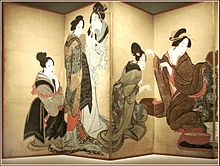

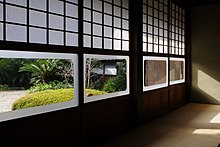
Language in Japan
[edit]- Japanese language
- Japanese dialects
- Kansai dialect
- Saga-ben
- Wasei-eigo (Japanese English)
- Ryukyuan languages
- Foreign Variations
- Writing systems of Japan
People of Japan
[edit]Ethnicity in Japan
[edit]Stereotypes in Japan
[edit]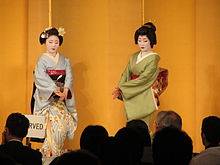
Religion in Japan
[edit]Sports and gaming in Japan
[edit]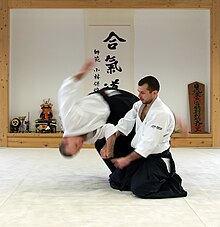
- Sports
- Aikido
- Baseball in Japan
- Association football in Japan
- Kendo
- Puroresu (professional wrestling)
- Sumo
- Traditional games
Economy and infrastructure of Japan
[edit]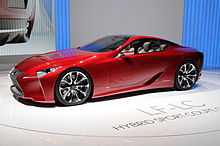
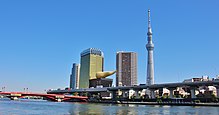
- Economic rank, by nominal GDP (2007): 2nd (second)
- Agriculture, forestry, and fishing in Japan
- Automotive industry in Japan
- Bank of Japan
- Buildings and structures in Japan
- Companies of Japan
- Communications in Japan
- Construction industry of Japan
- Consumer electronics industry of Japan
- Currency of Japan: Yen
- Department stores in Japan
- Defense industry of Japan
- Economic history of Japan
- Economic relations of Japan
- Energy in Japan
- Financial system of Japan
- Health care in Japan
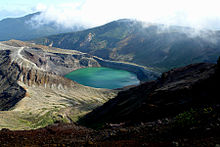
- Labor market of Japan
- Manufacturing industries of Japan
- Monetary and fiscal policy of Japan
- Mining in Japan
- National parks of Japan
- Private enterprise in Japan
- Research and development in Japan
- Standard of living in Japan
- Trade policy of Japan
- Trade and services in Japan
- Tourism in Japan
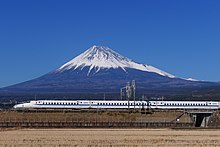
Education in Japan
[edit]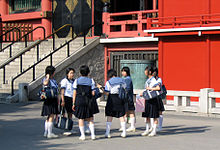
- History of education in Japan
- Japanese history textbook controversies
- Juku (Cram School)
- Language minority students in Japanese classrooms
- Romanization of Japanese
- School uniforms in Japan
- Yutori education
Structure of education in Japan
[edit]Health in Japan
[edit]Science and technology of Japan
[edit]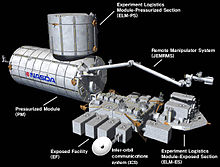
See also
[edit]- List of international rankings
- List of Japan-related topics
- Member state of the Group of Twenty Finance Ministers and Central Bank Governors
- Member states of the United Nations
- Migration in Japan
- Outline of Asia
- Outline of geography
- Tourism in Japan
| Japan |
|---|
| Index (Alphabetical indices) |
| 0–9 A B C D E F G H I J K L M N O P Q–R S T U–V W–X Y–Z |
| Navigation |
Notes
[edit]- ^ The Emperor has no executive authority, but is treated as a head of state under diplomatic protocol
- ^ While the Yamato period (250–710 CE) is considered to include both the Kofun and Asuka periods, as it spans both an archaeological period (Kofun) and a historical period (Asuka), it is held by many to be an outdated period of division in Japan's history, and no longer applicable in discussions of period division.
References
[edit]- ^ "Facts and Figures of Japan 2007 01: Land" (PDF). Foreign Press Center Japan. p. 1. Retrieved 2009-07-04.
- ^ "Standard Country and Area Codes Classifications". United Nations Statistics Division. 2010-04-01. Retrieved 2010-07-16.
- ^ "Japan". The World Factbook. United States Central Intelligence Agency. July 14, 2009. Retrieved July 23, 2009.
External links
[edit]Official
[edit]- Kantei.go.jp—Official prime ministerial and cabinet site
- Kunaicho.go.jp—Official site of the Imperial family.
- Ministry of Foreign Affairs—Detailed papers on Japan's foreign policy, education programs, culture and life.
- Shugi-in.go.jp—Official site of the House of Representatives
- National Diet Library (English)
Media
[edit]Tourism
[edit]- Japan National Tourist Organization
 Japan travel guide from Wikivoyage
Japan travel guide from Wikivoyage
Other
[edit]- CIA World Factbook—Japan
- Encyclopædia Britannica's Japan portal site
- Guardian Unlimited—Special Report: Japan
 Wikimedia Atlas of Japan
Wikimedia Atlas of Japan- Works by Government of Japan at Project Gutenberg containing the 1889 and 1946 Constitutions

